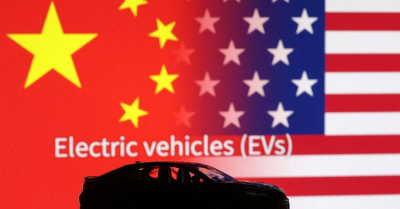Reuters-Senator asks Treasury to bar Chinese battery firms minerals from US EV tax credits
November 13, 2023 2 min 372 words
这则报道突显了美国国会对中国电池公司及矿产参与美国电动车税收优惠的担忧。曼钦参议员敦促财政部采取“最严格的标准”以杜绝中国生产的矿产或电池公司获得电动车税收抵免。此举旨在防止美国税收优惠被中国利用,并强调美国不应容许其敌对国家滥用矿产。报道指出,2022年通过的法案旨在削减对中国电池供应链的依赖,但曼钦指出,中国目前占据全球74%的阴极产量、92%的阳极产量和76%的锂离子电池产量。对于“关切的外国实体”的定义,汽车行业仍在等待财政部的详细指导。曼钦呼吁使用最严格的度量标准,以确保法案没有漏洞,避免从中国或其他有关国家进行矿产和材料“洗钱”。这表明美国对维护国内电动车产业及相关税收政策的敏感性,并凸显了对中美关系的经济影响担忧。
Democratic Senator Joe Manchin urged the U.S. Treasury on Monday to adopt the "strictest possible standards" to prevent Chinese-produced minerals or Chinese battery companies from winning electric vehicle tax credits.
Manchin, who chairs the Senate Energy Committee, raised concerns in a letter to Treasury Secretary Janet Yellen about reports Chinese battery companies are actively pursuing business opportunities to take advantage of the credits, adding U.S. tax credits "cannot be allowed to be hijacked by adversaries engaging in mineral laundering."
In 2022, Congress passed the Inflation Reduction Act barring $7,500 in future consumer EV tax credits if any battery components are manufactured or assembled by a "foreign entity of concern."
The rules were aimed at weaning U.S. battery supply chains away from China, which Manchin noted is currently responsible for 74% of the world’s cathode production, 92% of anode production, and 76% of lithium-ion battery cell production.
The auto industry awaiting detailed guidance from the Treasury on what is considered a "foreign entity of concern" as they make investment decisions on producing batteries for their transition to electric vehicles.
The foreign entity of concern rules come into effect in 2024 for completed batteries and 2025 for critical minerals used to produce them. The Treasury did not immediately comment.
Manchin said the law does not allow for a "value added test" exception and it "would be unconscionable to reward bad actors through a loose or deliberately weak interpretation."
A key decision in the guidance is whether Ford Motor Co's (F.N) deal to license the technology of Chinese battery manufacturer CATL (300750.SZ) for use in Ford-owned U.S. battery plants will meet the Treasury's standards to access the tax credits. The arrangement has raised concerns among U.S. lawmakers.
Ford put its planned $3.5 billion Michigan battery plant on hold in September and said it was awaiting "final language" from the Treasury on whether batteries made using Chinese technology will qualify for tax credits.
Manchin said Yellen should "use the strictest metrics possible to ensure there are no loopholes that will lead to the laundering of minerals and materials from China or other nations of concern."

